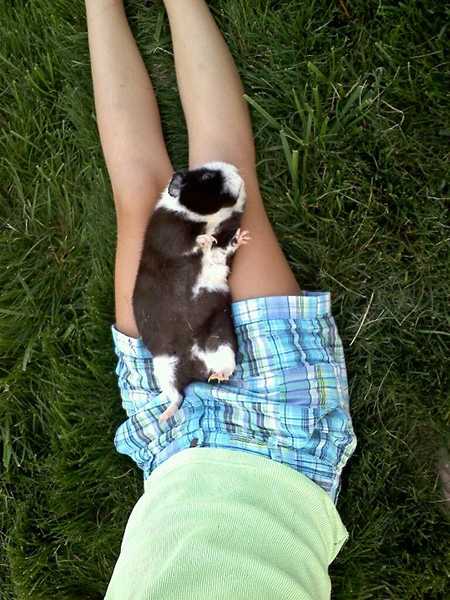Inside the Life of a Teen and Her Guinea Pig
Healthy Guinea Pig Tips
Guinea pigs crave one another’s company, according to the Humane Society for the United States. If you’ve acquired a new guinea pig as a companion for another, keep the newbie in a separate cage for 2 weeks. During this time, it shouldn’t interact with your resident guinea pig because of possible disease spread. Once you’ve had your vet check out the newbie, then gradually begin to introduce the piggies to each other.
Food and Water
- Buy commercial guinea pig pellets to provide most of your pet’s diet, along with small amounts of fresh fruit, such as orange slices, and vegetables, such as carrot peels. Fresh timothy or grass hay aids with digestion and limits the growth of a guinea pig’s teeth.
- When feeding your guinea pigs, avoid choking hazards like seeds and nuts, as well as sticky foods like peanut butter. For a list of safe foods, visit the Humane Society of the United States website.
- Use an inverted water bottle with a drinking tube, and provide fresh water every day. Clean the bottle with hot, soapy water every week to prevent algae.
Cage
- Provide a roomy cage. According to the Humane Society of the United States, guinea pigs can become bored or even depressed without something to hold their interest. Adequate room to exercise helps a guinea pig stay healthy and makes them less likely to become sick with heart disease or diabetes.
- Make sure the cage has solid flooring. Guinea pigs have sensitive paw pads and should not be kept in a wire-bottom cage.
Healthy Tips
- Schedule an annual veterinary check-up for your guinea pig to make sure there are no signs of disease or nutrition problems.
- Always wash your hands after handling your guinea pig.
- Guinea pigs are not the right pet for everyone, particularly people with weakened immune systems.
Madalyn, a seventh-grader in Michigan, bounces out of bed at 6 a.m. to feed her black-and-white guinea pig, Joanie. After washing her hands, she then fixes her own breakfast and dresses to leave for school with her dad at 7:15. Although she’s a busy 12-year-old, Madalyn places importance on her little pet’s well-being. Even with a full schedule of hobbies, homework, and hanging out with friends, she stays devoted to her 3-pound South American rodent.
In the afternoon, Madalyn’s priorities are the same. Coming home from school, she rushes to the computer room to check on Joanie and give her carrots and timothy hay to chew. She takes the guinea pig out of its cage to run around the house and get exercise. Madalyn follows closely to protect Joanie from the other four-legged family members: a dog and two cats. After spending quality time with her pets, Madalyn then gets down to business with her social life and homework. Her after-school schedule includes clarinet, archery, and volleyball practice.
Little Piggies Need Social Time

Madalyn and her guinea pig, Joanie, enjoy play time together.
(Photo courtesy of Valerie Wojno Alleman)
Guinea pigs need time out of their cage every day, and Madalyn is happy to provide it—whether playing or just holding Joanie on her lap while watching TV. Interaction and attention are important for the well-being of these social animals; they are very curious and love to investigate new toys and games. “Joanie is a great little furry friend. She’s fun, and the way she runs is really cute,” raves Madalyn. “She communicates with body language, like bobbing her head up if she wants you to stop petting her.” Guinea pig language ranges from purrs and squeaks to grunts and growls.
Madalyn enjoys their social time, too. Afterward, she does something important to stay healthy. After touching the guinea pig or its cage, Madalyn washes her hands to protect herself from germs. Each week, she and her mom thoroughly clean the cage, which is lined with wood shavings on top of puppy pads to help soak up any odor. Madalyn also bathes Joanie occasionally, running an inch of warm water in the sink, rubbing the guinea pig’s body with mild pet shampoo, rinsing it off, and drying her in warm towels.
Joanie needs to be groomed regularly to keep her skin and coat healthy. It doesn’t take long for Madalyn to brush her pet’s short hair each week with a soft dog grooming brush. This helps keep the house clean, too, because guinea pigs shed their hair.
With proper healthcare, diet, and exercise, guinea pigs can live an average of 5 to 7 years. Their lifespan is longer than that of many other small pets, including hamsters, gerbils, and mice. Over the years, Madalyn and her family have had four guinea pigs to prevent a solitary pet from becoming lonely and bored. One of them who was Joanie’s buddy recently passed away. Madalyn’s mom says a male and female together would breed frequently, so that’s why she prefers having just female guinea pigs at the same time.
The family tends to the piggies’ health as well as social needs. Regular veterinary check-ups are important for these little animals. Two of Madalyn’s guinea pigs suffered from upper respiratory infections, and needed antibiotics. Helping with their care has taught her responsibility.
Madalyn and her mom report that cuddly little guinea pigs make easy pets to take care of and are sweet and gentle. As Madalyn explains, “They’re not noisy like a hamster would be. They‘re not too hyper. They’re nice. They’re totally adorable!” In addition to being so cute, guinea pigs have provided Madalyn with a chance to bond socially, exercise more, and learn to be dependable for others.
- Page last reviewed: February 8, 2017
- Page last updated: February 8, 2017
- Content source:


 ShareCompartir
ShareCompartir